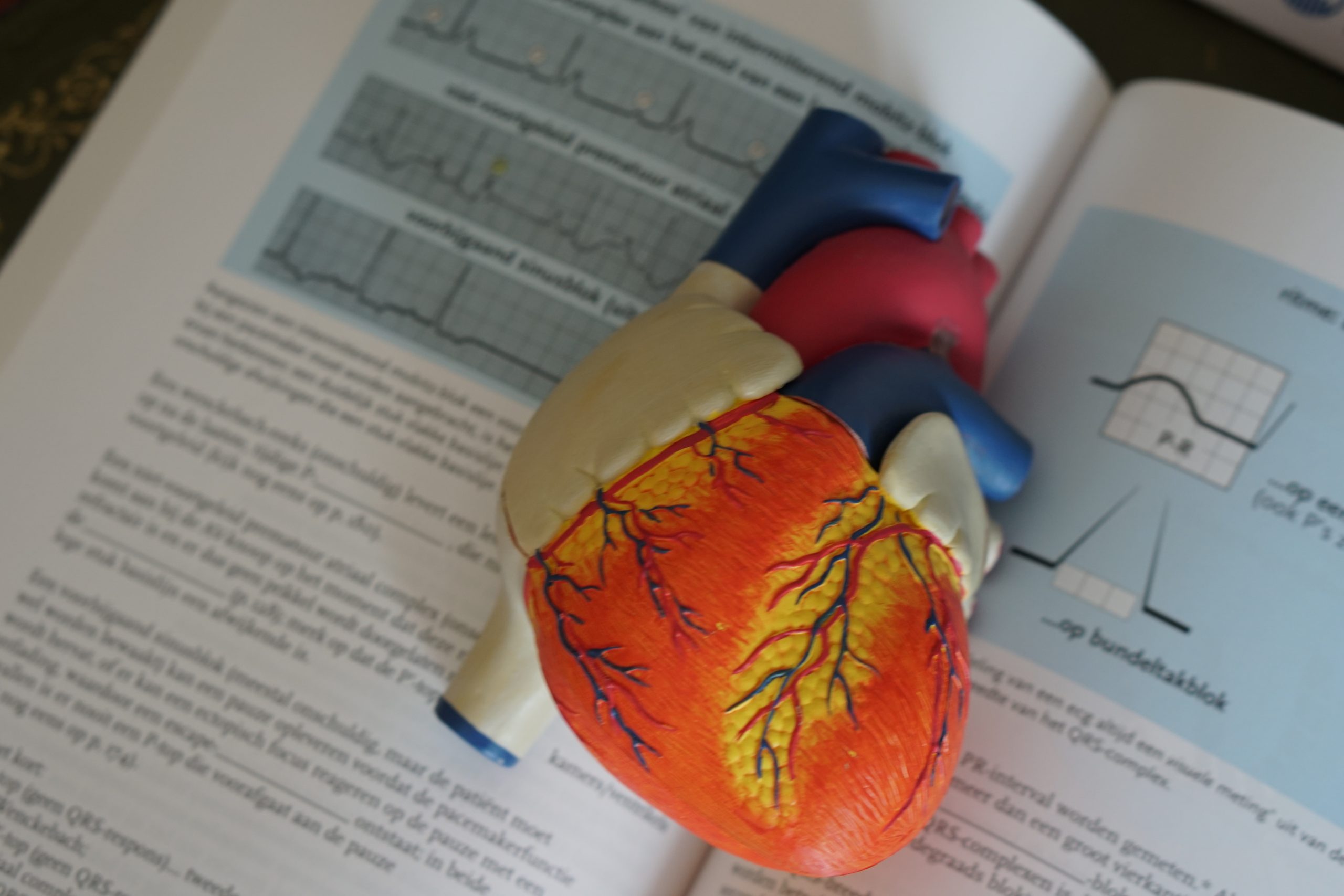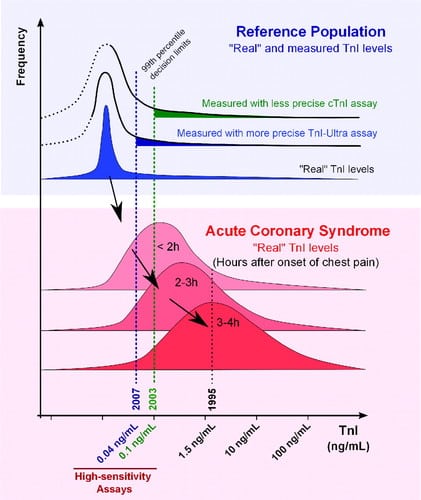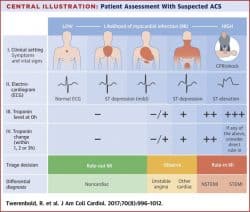People usually find out they have a high troponin when they are in the emergency room for an acute problem. This article will discuss the reasons that you might have an elevated troponin level.
What is A High Troponin Level?
If you go to the emergency room with complaints of :
- Chest pain
- Nausea and vomiting
- Back pain
- Shortness of breath or
- Chest pressure the doctor will most likely give you a troponin test.
I discussed in detail what the troponin test is in this post. This article will discuss why troponins are often elevated and what they signify.
The sensitivity of Cardiac Troponins
Cardiac troponins are markers that your heart puts out when the heart muscle is damaged. The troponin test is the gold standard test that healthcare providers use to determine if cardiac damage has occurred.
Troponin is a protein complex that consists of three separate subunits.
- Troponin T is expressed in the heart
- Troponin I is expressed in the heart
- Troponin C is expressed in the heart and skeletal muscles.
These three units are involved in the skeletal and cardiac muscles. Troponin is involved in how the muscles contract.
Therefore, you can see if the heart muscle has been injured, the troponin levels will be high.
The troponin test can only be done via blood tests.
An elevated troponin does not always mean you have a heart problem. Read on to find out some of the reasons that a troponin level might be elevated.
Troponin Test and Heart Disease
The troponin test is performed when the doctor suspects a heart attack or heart muscle damage. The most important use of the troponin test is to determine if the patient is suffering from Acute Coronary Syndrome.
Acute Coronary Syndrome is a wide range of cardiac conditions that can happen when the heart does not have adequate blood flow from the coronary arteries.
Therefore, if a patient comes into the emergency room complaining of cardiac symptoms, the nurse will prepare to do a troponin test, an EKG, and most likely a chest Xray.
Medical providers rely on this test because it is highly sensitive. The test only takes about 30 minutes to get the results back.
What if the troponin level is Negative?
If the troponin is negative, most likely the doctor will repeat the level 3-4 hours later. This is because the troponin level sometimes takes a couple of hours to start showing up in the blood.
What if the Troponin Level is Positive?
The troponin level varies according to the lab that is used. However, a troponin level is considered high if the level is greater than 0.04 ng/ml in most labs.
If the troponin is positive, the doctor must take action immediately because a high level might constitute heart damage. As you know time equals muscle. If the troponin level is positive the doctor will order a troponin level every 3 hours until the troponin levels start to go down.
The physician will also order an EKG to be done at the same time the troponin level is done. This is done to see if the EKG has any changes that correlate with the rise in troponin levels.
If the patient is symptomatic such as having chest pain or shortness of breath, the nurse will apply oxygen, and the doctor will order some medications. The doctor will also order a cardiac consult.
The doctor will admit the patient to the hospital in either an observation status or an inpatient status in acute medicine. The hospital physicians will then follow up on why the troponin is elevated.
What Happens When You Have Elevated Troponins But No Heart Damage?
Even though sometimes elevated Troponins are considered for heart damage, sometimes a person can have elevated troponins and not have heart damage.
Patients who don’t have heart problems can also have elevated troponins.
Some of these conditions are:
- Sepsis
- Burns
- Autoimmune diseases
- Congestive heart failure
- Pulmonary embolism
- Low oxygen levels
- Renal failure
Many of these conditions overlap with heart disease symptoms. Therefore, it is important that when a patient comes into the emergency room with these known diagnoses, the doctor must still rule out acute coronary syndrome.
Conditions That Cause Elevated or High Troponins
Sepsis
Sepsis is the most common cause of death in patients who are critically ill. Sepsis is an infection of the blood. Sepsis causes a cascade of problems in the body because every organ is infected. The bacteria in sepsis causes nuclear proteins called histones to cause severe damage to the heart muscle.
We know that any time the heart muscle is damaged, the troponins will be elevated.
Burns
Burns, especially second and third-degree burns cause cellular damage and death. The heart is made of cells. When people get burned, they exhibit massive electrolyte imbalance.
The heart functions on magnesium, potassium, and other nutrients When the heart does not get the required vitamins and minerals, the heart muscle can suffer damage. This is why troponins are elevated in patients with burns.
Autoimmune Diseases
Autoimmune diseases such as lupus and sarcoidosis can affect the heart in a negative way. For example, in sarcoidosis, the granulomas attack the heart muscle. This process causes the heart muscle to become stiff. When the heart becomes stiff, it cannot contract properly. When the heart muscle becomes stiff, the troponin can be elevated.
Congestive Heart Failure
Congestive heart failure is when the heart can no longer pump blood effectively to the tissues and organs. The most common cause of this weakness is because the left ventricle is weakened because of high blood pressure.
When the left ventricle is weak, the heart has to work very hard to get blood and oxygen to the rest of the body. This strain on the heart causes an elevation of troponin because whenever the heart muscle is stressed, the troponin level will be elevated.
Pulmonary Embolism
Pulmonary embolism is a serious disorder if not treated it can be fatal. This happens when a clot blocks the pulmonary arteries in the lungs. Because of the anatomy of the heart and lungs, the right side of the heart is compromised when a pulmonary embolism is present.
When the heart is compromised, troponins will rise.
Low Oxygen Levels
When you have low oxygen levels, your blood going to the heart has low oxygen. When this happens, the muscle of the heart can become damaged. When the cells of the heart die off, this cascade of events can cause an elevation in troponin.
Bottom Line
Although troponin levels are the gold standard for initially diagnosing heart muscle damage, these are other reasons why troponin levels can be elevated. It is important that your doctor does a thorough physical assessment whenever a patient presents with an elevated troponin level.
My name is Phyllis Robinson MSN, RN. I have been a Registered Nurse for 27 years in the Cardiac Intensive Care Unit. I am passionate about cardiac care and heart disease. I also want this blog to be an educational tool that people can refer to for traditional and alternative treatment. I will blog on heart disorders such as high blood pressure, congestive heart failure, cardiomyopathy, and high cholesterol.
I received my Nursing degree from Baltimore Community College.
I went on to receive my Masters in Nursing from Walden University
I have worked for almost 30 years in Critical Care with a focus on heart health. I am an advocate of preventive healthcare.




